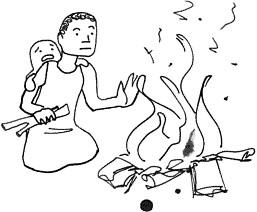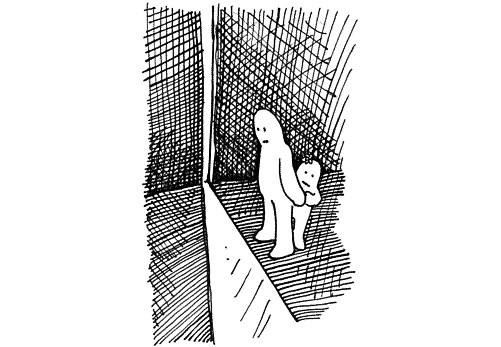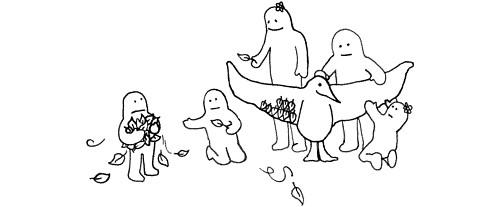
Not far from the hills of the Matopos there lived a family whose children were made out of wax. The mother and the father in this family were exactly the same as everyone else, but for some reason their children had turned out to be made of wax. At first this caused them great sorrow, and they wondered who had put such a spell on them, but later they became quite accustomed to this state of affairs and grew to love their children dearly.
It was easy for the parents to love the wax children. While other children might fight among themselves or forget to do their duty, the wax children were always dutiful and never fought with one another. They were also hard workers, one wax child being able to do the work of at least two ordinary children.

The only real problem which the wax children gave was that people had to avoid making fires too close to them, and of course they also had to work only at night. If they worked during the day, when the sun was hot, wax children would melt.
To keep them out of the sun, their father made the wax children a dark hut that had no windows. During the day no rays of the sun could penetrate into the gloom of this hut, and so the wax children were quite safe. Then, when the sun had gone down, the children would come out of their dark hut and begin their work. They tended the crops and watched over the cattle, just as ordinary children did during the daytime.
There was one wax child, Ngwabi, who used to talk about what it was like during the day.

“We can never know what the world is like,” he said to his brothers and sisters. “When we come out of our hut everything is quite dark and we see so little.”
Ngwabi’s brothers and sisters knew that what he said was right, but they accepted they would never know what the world looked like. There were other things that they had which the other children did not have, and they contented themselves with these. They knew, for instance, that other children felt pain: wax children never experienced pain, and for this they were grateful.
But poor Ngwabi still longed to see the world. In his dreams he saw the hills in the distance and watched the clouds that brought rain. He saw paths that led this way and that through the bush, and he longed to be able to follow them. But that was something that a wax child could never do, as it was far too dangerous to follow such paths in the night-time.
As he grew older, this desire of Ngwabi’s to see what the world was really like when the sun was up grew stronger and stronger. At last he was unable to contain it any more and he ran out of the hut one day when the sun was riding high in the sky and all about there was light and more light. The other children screamed, and some of them tried to grab at him as he left the hut, but they failed to stop their brother and he was gone.

Of course he could not last long in such heat. The sun burned down on Ngwabi and before he had taken more than a few steps he felt all the strength drain from his limbs. Crying out to his brothers and sisters, he fell to the ground and was soon nothing more than a pool of wax in the dust. Inside the hut, afraid to leave its darkness, the other wax children wept for their melted brother.

When night came, the children left their hut and went to the spot where Ngwabi had fallen. Picking up the wax, they went to a special place they knew and there Ngwabi’s eldest sister made the wax into a bird. It was a bird with great wings and for feathers they put a covering of leaves from the trees that grew there. These leaves would protect the wax from the sun so that it would not melt when it became day.
After they had finished their task, they told their parents what had happened. The man and woman wept, and each of them kissed the wax model of a bird. Then they set it upon a rock that stood before the wax children’s hut.


The wax children did not work that night. At dawn they were all in their hut, peering through a small crack that there was in the wall. As the light came up over the hills, it made the wax bird seem pink with fire. Then, as the sun itself rose over the fields, the great bird which they had made suddenly moved its wings and launched itself into the air. Soon it was high above the ground, circling over the children’s hut. A few minutes later it was gone, and the children knew that their brother was happy at last.

